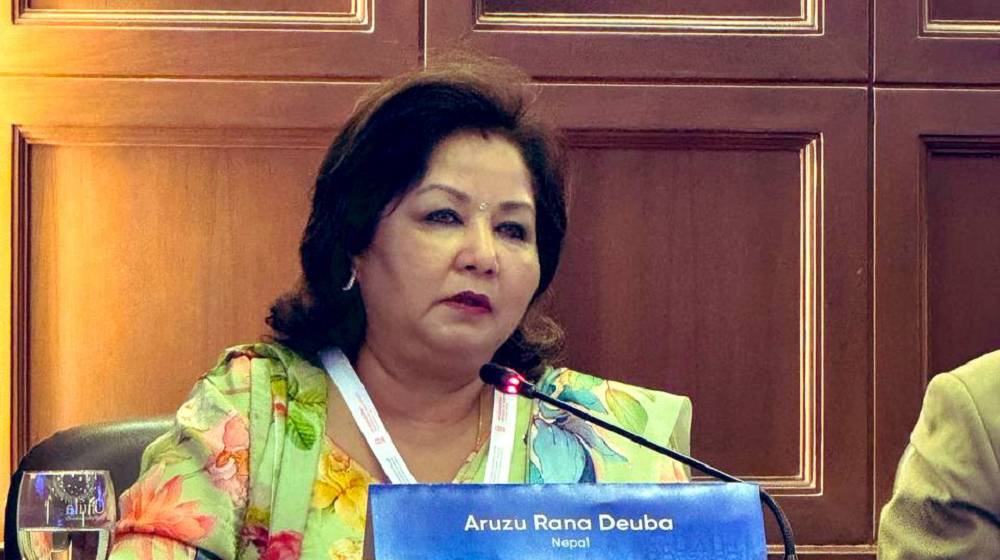RPP’s protest fizzles despite bold threats
A few days ago, the Rastriya Prajatantra Party (RPP) had announced plans to breach the restricted zone near the federal parliament, calling for a protest on Sunday to demand the reinstatement of the monarchy and the release of its detained leaders.
However, the protest failed to gather significant mass support. While the turnout on the streets was minimal, RPP lawmakers managed to stage a symbolic protest inside Singhadurbar, the federal government’s administrative complex. After a meeting at the party’s Parliamentary Party Office, they displayed handwritten pamphlets bearing various slogans.
Police detained RPP Chairperson Rajendra Lingden, Vice-chairperson Buddhiman Tamang, and Chief Whip Gyanendra Shahi from inside Singhadurbar. All three were released later in the evening.
Anticipating unrest following the party’s announcement to enter restricted areas, authorities had tightened security in Kathmandu. A large number of security personnel were deployed around designated restricted zones, including the area surrounding New Baneshwar.
Traffic in Kathmandu was severely disrupted after police barred vehicle movement in and around New Baneshwar. However, once the protest failed to gain traction, normal traffic resumed. The ongoing teachers’ protest, now in its second week, further exacerbated the traffic chaos.
Last week, during an executive committee meeting, Party Chair Lingden accused the government of curbing citizens’ fundamental rights by arbitrarily declaring areas as off-limits. “We are being pushed into a corner. That’s why we’ve decided to protest in restricted zones,” he said.
The RPP has also vowed to launch both legal and political campaigns demanding the unconditional release of party leaders Rabindra Mishra and Dhawal Shumsher Rana, who were arrested for allegedly inciting deadly violence on March 28. That incident claimed two lives and left over 100 injured, as arson and vandalism broke out in different parts of the capital.
In response to RPP’s threat to breach restricted areas, the Ministry of Home Affairs issued a stern warning on Saturday night. “Legal action will be taken against anyone violating the law or inciting public disorder,” the ministry stated, adding that any activity promoting anarchy or undermining the constitution would not be tolerated. The ministry also urged the public to refrain from any “anarchic, provocative or illegal acts” that could lead to violence.
The government has declared the area surrounding the federal parliament in New Baneshwar—and several other locations across Kathmandu—as restricted zones.
Earlier, on April 8, RPP staged a protest assembly in Balkhu, a site designated by the government, reiterating its demand for a constitutional monarchy and the declaration of Nepal as a Hindu state.
India's Modi to host JD Vance in Delhi under US tariffs shadow
U.S. Vice President JD Vance begins a four-day visit to India on Monday and will hold talks with Prime Minister Narendra Modi, as New Delhi rushes to avoid steep U.S. tariffs with an early trade deal and boost ties with the Trump administration, Reuters reported.
Their discussions will cover the first day of Vance's largely personal visit to the country with his family, which includes visiting the Taj Mahal and attending a wedding in the city of Jaipur, people familiar with the matter said.
Modi and Vance are expected to review progress made on the bilateral agenda outlined in Februarywhen the Indian leader met President Donald Trump in Washington. It includes "fairness" in their two-way trade and growing their defence partnership, according to Reuters.
Kyiv and Moscow accuse each other of countless violations of one-day Easter ceasefire
Russia and Ukraine accused each other of thousands of attacks that violated the one-day Easter ceasefire declared by President Vladimir Putin, with the Kremlin saying there was no order to extend the pause in frontline fighting, Reuters reported.
Washington said it would welcome an extension of the truce, and President Volodymyr Zelenskiy reiterated several times Ukraine's willingness to pause strikes for 30 days in the war.
But Putin, who sent thousands of Russian troops into Ukraine in February 2022 and who ordered on Saturday the halt in all military activity along the front line until midnight Moscow time (2100 GMT) on Sunday, did not give orders to extend it, according to Reuters.
China warns countries against striking trade deals with US at its expense
China on Monday warned countries against striking a broader economic deal with the United States at its expense, ratcheting up its rhetoric in a spiralling trade war between the world's two biggest economies, Reuters reported.
China respects all parties resolving economic and trade differences with the United States through consultation on an equal footing, but it will firmly oppose any party striking a deal at China's expense, its Commerce Ministry said.
Beijing "will take countermeasures in a resolute and reciprocal manner" if any country sought such deals, a ministry spokesperson said, addressing a news report that the Trump administration was preparing to pressure other countries to limit trade with China in exchange for tariff exemptions from the United States, according to Reuters.


















